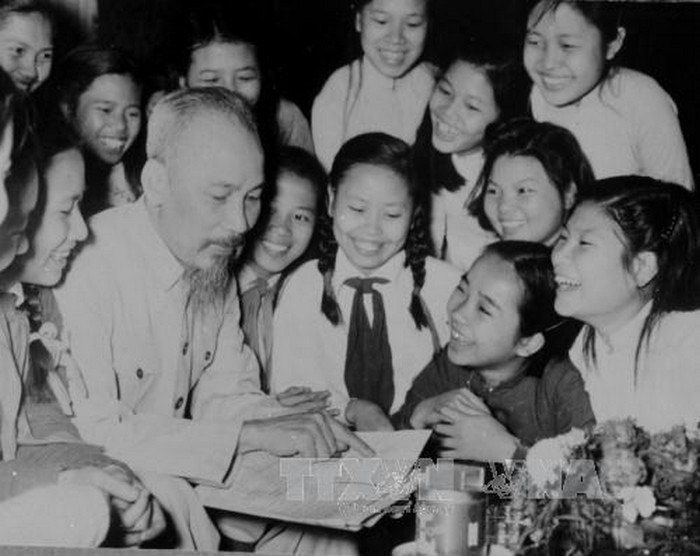
Late President Ho Chi Minh's legacy inherited, promoted by generations
Latest
 |
| Late President Ho Chi Minh and students from Hanoi's Trung Vuong Secondary School in May 1956. (Photo: VNA) |
The 24th General Conference of UNESCO in 1987 adopted the resolution which recommended that the director-general and member states celebrate the centenary of the birth of President Ho Chi Minh (1890-1990) – a Hero of National Liberation and a Great Man of Culture of Vietnam.
The same year, Vietnam began its national reform (Doi Moi), facing myriad difficulties and challenges. The resolution held a great significance as it formed a source of encouragement from the international community for the Southeast Asian nation on its path to realise its development goals.
Thirty-five years later, a grand celebration was held in Hanoi involving a host of activities from a meeting and book launch to an exhibition and a seminar. The events revolved around people’s affection for the late President, his life and career, and the legacy he left.
The recent commemoration saw the participation of Vietnamese Party and State leaders, heads of Vietnamese representative agencies overseas, historical witnesses, experts and researchers from Vietnam and abroad. Visiting UNESCO Director General Audrey Azoulay and more than 30 foreign ambassadors and heads of missions to Vietnam also participated.
Participants said that for peoples around the world, President Ho Chi Minh was not only a Hero of National Liberation who inspired and encouraged oppressed peoples to stand up against old and new colonialism, but also a Great Man of Culture who offered a vivid embodiment of respecting, preserving and promoting the cultural traditions of each nation, respecting differences and diversity, and promoting understanding and solidarity.
Honouring President Ho Chi Minh and his cultural heritage
Expressing her honour to be in Vietnam on the 35th anniversary of UNESCO's adoption of Resolution 24C/18.65, UNESCO Director General Audrey Azoulay affirmed that the late President’s influence reaches far beyond the country's borders, because throughout his life, he maintained close and constant relationships with many different cultures.
She said President Ho Chi Minh made education and culture, which are UNESCO's foundational values, the focus of his life and political career.
He fought against gender stereotypes and always worked to ensure women could go to school, Azoulay noted, citing President Ho Chi Minh as saying all people are equal before the law, and women enjoy all rights equally with men in all aspects of politics, economy, culture, education and family.
The legacy of President Ho Chi Minh has contributed to a modern Vietnam that attaches great importance to culture and education in its development policies, she stated.
The UNESCO Director General held that the best way to commemorate the President's legacy is to continue working together to protect education, culture and heritage as common values of humanity.
President Ho Chi Minh a typical example
Lao Deputy Ambassador to Vietnam Chanthaphone Khammanichanh said that Prince Souphanouvong, President Kaysone Phomvihane, and President Ho Chi Minh built the foundation for and cultivated a special solidarity and friendship between Vietnam and Laos, making it an exemplary, faithful, pure, and rare relationship in the world.
The deep affection that the Lao people have for President Ho Chi Minh always remains intact, the diplomat noted, adding that the leader has become a symbol of the nations’ solidarity and friendship.
According to him, memorial sites dedicated to President Ho Chi Minh in Laos have been established with local donations. Lao people hold a special respect for the late President, and they express their affection by hanging pictures of President Ho Chi Minh and of Lao leaders in the most solemn place in their homes.
Leaders of Laos who had the opportunity to meet President Ho Chi Minh have affirmed he was an example of a man with a great endeavour for the development of solidarity and friendship among nations, and that he skillfully combined genuine patriotism with pure internationalism of the working class.
Ho Chi Minh’s legacy in military field
Professor Vladimir Kolotov, head of the Ho Chi Minh Institute at St. Petersburg University in Russia, emphasised the late President was no doubt a national hero, adding that to find a strategy to defend his country, President Ho Chi Minh researched and modernised the military sector of Vietnam.
According to the expert, President Ho Chi Minh absorbed the principles of military tactics and passed this knowledge on to generations of Vietnamese leaders so they could make strategic plans based on the realities and anticipate the outcomes of future wars.
The leader believed in the victory of the Democratic Republic of Vietnam, and the lessons from Vietnam in its struggle for independence are still fresh in today's world of high-precision weapons, information technology and supercomputers, he stated.
In conclusion, President Ho Chi Minh left an extremely valuable legacy, which includes his thought, morality and style demonstrated in many fields. This is a valuable asset not only for Vietnamese but also all progressive peace-loving peoples around the world.
Ambassador Nguyen Phuong Nga, President of the Vietnam Union of Friendship Organisations, emphasised in her speech at an international conference on Ho Chi Minh’s legacy for humanity that popularising the value of Ho Chi Minh's heritage is one of the most effective methods to promote and introduce the country, people, history and culture of Vietnam to the peoples worldwide.













